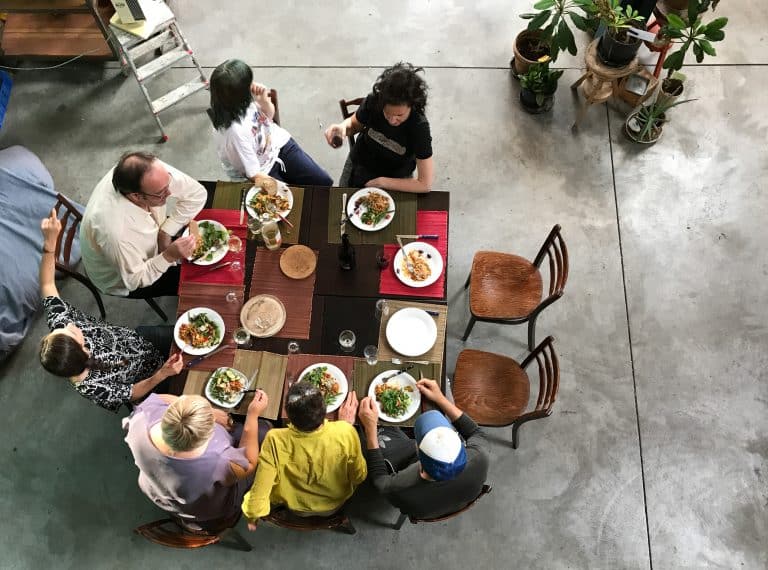
Image by Ian D. Keating/Flickr, Attribution.
When Breath Becomes Air: The Perfect Book at the Perfect Time
I’m sitting on a plane sniffling in between sips of ginger ale. For a time I sat in the dark, my right hand resting on my growing belly where a little being I have yet to see pushes up against my abdomen more and more often these days. I cried.
I looked over at John, my partner, whose head is bobbing as he falls asleep, his arms folded across his chest. Then I opened my computer. Paul Kalanithi’s When Breath Becomes Air lies on the seat next to me.
There are no words left for me to read — this devastatingly beautiful and beautifully devastating book by a neurosurgeon who chronicles his own death and the meaning he gleans from it. The end caught me off-guard. I immediately wished for more words, frantically reading the acknowledgments, his bio, even the table of contents as if they would reveal something additionally important.
Then I realized my sense of being caught off-guard matches his own experience, the experiences of his family and friends. His death rushed in, not long after the birth of his daughter. He lives on through her and through this book — and through this feeling that fills me.
I got my 20-week sonogram last Friday morning. My parents were in town; they came along and sat in the small room with me as the sonographer squeezed the gel onto my protruding belly and started pressing the wand into me, searching for this one-pound mystery that’s taking shape within my body, within the narrative of my life.
My dad marveled, as is his M.O., at the technology, at the technician’s skill, at the wonder of it all. My mom sat near me in a chair, delighted, but also more grounded somehow. I could almost feel the gravity of her experience, of her wisdom. She’s been viscerally intimate with the risk and miracle of all of this.
“Did they do a sonogram like this when you were pregnant with me?” I asked her.
“I know we got a picture, but I don’t remember ever seeing anything on a screen like this: the movement, the clarity,” she explained.
I felt so aware, in that moment, of time folding in on itself. My parents are now witnessing their third grandchild taking form, another piece of the puzzle of their story, a story they can’t believe is filled with good fortune, even as it has been filled with suffering and loss. I felt like a vessel, not just for this baby, but also for a surprising story — one that none of us singularly authors.

We got pictures. In some, it looks like my tiny girl is waving. In another, she’s sucking her thumb (or so the sonographer guessed). Her profile is there, plain as day.
“She’s got your nose,” my dad said. I laughed at him.
By noon the office called to say that they wanted me to come back in for another sonogram.
“It’s not a problem,” the receptionist emphasized in the voicemail. “The doctor just wants a better view of the baby.”
I was immediately filled with dread, imagining all of the things that might be wrong. Her well-intentioned words — “it’s not a problem” — seemed like a trick. John tried to reassure me with rationality and hugs. Friends tried to reassure me via rapid text message exchanges. I tried to reassure myself, thinking: You know that life doesn’t exist on two planes — perfect and doomed. It exists on a spectrum of imperfection. This baby, this story, is not over because it may have some imperfection. All humans do. It’s just a matter of when and how we discover them, what we do about them. That’s how grace is born.
Before I got into bed that night, I crept into my two-year-old daughter’s room and watched her sleep by the faint light of the hallway. I do this almost every night now. Just for a moment.
When I got into our bed, I felt so filled with incredulity that human beings tolerate loss, or even the threat of it. I can imagine that something might be wrong with this pregnancy, and it’s frightening but a sliver of me can imagine being strong about it and working through it. But no part of me understands how to cope with the reality that something could happen to my Maya.
I blurt out to John in the darkness, “How can anyone be a parent and tolerate the truth that something terrible could happen to a child?”
“But we keep her safe. The people who care for her keep her safe,” he reassured me.
“But none of us have total control. She could get in an accident or get cancer…” I trailed off.
My incredulity wasn’t limited to the dread that a parent lives with, but the dread that a human lives with. How can any of us tolerate living when death — specifically death of people we love — is so possible? So inevitable, actually.
“Everything is going to be okay,” he said, the thing we say because we must, and because, depending on your definition of okay, it is true.

The next day, I woke up and fed Maya waffles and we studied a slug on the sidewalk and John and I laughed at ourselves in traffic. The next day I found out there truly wasn’t anything wrong with my pregnancy, just a picture missing.
The next day, I read When Breath Becomes Air.
It speaks to the heart of my incredulity in the darkness of our shared bedroom. We go on, keep loving, risk losing, because we have no other choice. We might die. We will die eventually. Or by some lights, even worse, people we love might die, will die eventually, and there’s nothing we can do.
It’s what makes love so brave. The bravest thing you can do, really. To love a child, of course, doesn’t feel particularly brave on the surface, because it doesn’t feel like a choice. My heart-shattering love of Maya grew up as she did, as involuntary as her own tenacious quest to become a person who eats and speaks and walks.
Paul Kalanithi teaches me that meaning-making is not a choice. No, we don’t write our own stories. No, we don’t have ultimate control. But we do have agency to make our time count. And it follows that we can’t make our time count if we are sitting around, paralyzed by the fear of losing those we love. There is meaning in contemplating the fragility of life, but you can’t dwell here too long or you lose track of the opportunity to make meaning in the midst of all the fragility. Kalanithi, even in his final days, sought the pleasure of poetry and ideas and work and service.
He wrote a book, an incomplete book, that felt utterly complete to me in how it transmitted these messages that I needed to hear, on this airplane now rumbling through turbulence somewhere over eastern Wisconsin. I am side-by-side with a partner whom I crave to grow very old and silly with, with whom I am creating a flawed but sturdy home for a restless little being who I hope is healthy. I am the mother of a two-year-old, whose very in-and-out breaths I worship. I am the daughter of parents who I desperately don’t want to lose anytime soon. I am a reader, a writer, fragile and brave, a meaning-maker.


Share your reflection